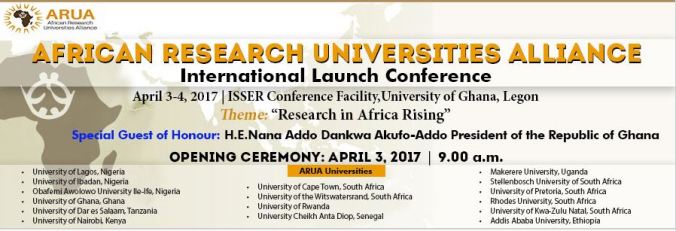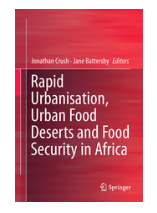In July 2018 CUP hosted a PhD workshop for scholars working on urban food issues in Africa.
Here is a video documenting the meeting. We hope that the workshop creates a network of next generation African scholars.
In July 2018 CUP hosted a PhD workshop for scholars working on urban food issues in Africa.
Here is a video documenting the meeting. We hope that the workshop creates a network of next generation African scholars.

Read CUP’s new paper in Nature Sustainability here for free: https://www.nature.com/articles/s41893-018-0051-y.epdf?author_access_token=JHeolKUORAddwBG3M5F7I9RgN0jAjWel9jnR3ZoTv0P7f0GtHkp0bHrg42Wb_XZ3VRzaZMj14CerxfCx4z2yNeqavWy4pZhfHtmOUKt6WHwpoZkVussdSGIOBW41Y8RyAck–NGuYwhjSD7wz85P1Q%3D%3D
Three members of the CUP team (Jane Battersby, Murray Leibbrandt and Harro von Blottnitz) attended the launch conference of ARUA (African Research University Alliance) in Accra, Ghana on 2-4 April 2017.

“ARUA, a partnership of research universities in Africa, was launched in early 2015 as a response to the growing challenges faced by African universities. The alliance will form a hub that supports centres of excellence in many other universities across the continent. The focus is on building indigenous research excellence to enable the continent to take control of its future and assert itself as a powerful global force.” https://www.uct.ac.za/usr/news/downloads/2016/UCT-research-across-networks.pdf
The conference focused on 13 strategic thematic areas identified by ARUA, including Food security, poverty and inequality, unemployment and skills development, mobility and migration, good governance, energy, and urbanization and habitable cities – all themes addressed within CUP.
CUP looks forward to seeking synergies with new partners across Africa to advance research, policy and the intersections between the two.
James Duminy has recently published his paper “Ecologizing regions; securing food: governing scarcity, population and territory in British East and Southern Africa” in Territory, Politics, Governance.
It can be accessed here: http://www.tandfonline.com/eprint/Iiks3SAzuChNpvWfTFkf/full (If you don’t have access to the journal and want a copy, please email consumingurbanpoverty@gmail.com)
Abstract: “The focus is on the government of food systems in British East and Southern Africa in the mid-twentieth century, and the influence of ecological science on late colonial governmentality. The aim is to contribute to current debates emphasizing the need to uncover the political and historical specificities of territory, as well as to broaden the concept beyond its legal, political-economic and strategic features, and the bounded scale of the nation-state. It is argued that a focus on colonial problematizations of government, through the lens of food, contributes to these discussions in at least two ways: First, by producing substantive knowledge of a context under-examined in the literature on territory. Second, by contributing to the theorization of territory in broadening its ambit to include ecological knowledge and practices oriented towards the calculative political control of earth processes, and caring for various systemic relations between matter and life. Governing colonial food systems linked a range of economic and ecological problems and hence food provides a suitable lens to study the historical interrelations of biopolitical and geopolitical techniques.”
CUP’s Jane Battersby has just published a new AFSUN working paper:
Battersby, J., Marshak, M. & Mngqibisi, N. (2017) Mapping the invisible: The informal food economy of Cape Town, South Africa, AFSUN Working Paper Series, No. 24, Cape Town, South Africa: http://www.afsun.org/wp-content/uploads/2016/11/AFSUN24.pdf
“This report argues that it is essential to understand the dynamics of the informal food retail sector because of its vital role in ensuring greater access to food by the urban poor. Existing policy frameworks to address food security and to govern the informal sector tend to neglect informal retail in the food system. As a result, the sector is poorly understood. The report therefore attempts to identify the characteristics of the sector that impact on its ability to address the food needs of the neighbourhoods in which the businesses are located. Although the research is focused on Cape Town, the findings are of broader relevance.”
This event is being hosted by colleagues at UCT. It should be an excellent day grappling with issues of consumption.
“We are delighted to invite you to a one-day symposium hosted by the Department of Environmental and Geographical Science, University of Cape Town, on 9 March 2017. The event is supported by a British Academy/Newton Advanced Fellowship on Consumer Ethics in Post-Apartheid South Africa.
Call for papers
The geographies of consumption in Africa are largely unwritten. What is clear, however, is that throughout history, the ability to consume and to judge ‘good’ consumption has also been the ability to materialise identity and difference. In contemporary Africa, the rapid growth of the middle-classes, juxtaposed with deep inequalities in fast-expanding cities, is creating dynamic spaces where imaginaries and practices of consumption are in flux. Debates about sustainability, food (in)security, urban agriculture, animal rights, conspicuous consumption, and political greed and corruption are prominent, and often racialized. This symposium focuses on this context where conflicting ethical judgements about what constitutes ‘good consumption’ directly emerge from and shape identity and belonging. We welcome papers that seek to engage with any aspect of the relationship between consumption and identity in African cities and towns, and to contribute to a deeper understanding of the ways in which consumption is made meaningful in the everyday lives of urban Africans.
Submission guidelines
Please send abstracts of not more than 250 words, attached as a Microsoft Word document, to Dr Shari Dayashari.daya@uct.ac.za by Friday 13 January 2017. All abstracts will be reviewed by the Fellowship team, and notifications of acceptance will be sent by 3 February 2017.
A small number of travel bursaries will be available to help support scholars travelling from outside Cape Town. If you wish to be considered for one of these bursaries please include a covering letter stating this, in the same file as your abstract. Preference will be given to postgraduate and postdoctoral researchers.”
The CUP team, including our advisory members will be meeting in Cape Town from 14-16 November. This meeting will reflect on the past project year and plot the path for the project for its third and final year.
CUP’s Gareth Haysom recently published this blog piece on the Urban Transformations website: http://www.urbantransformations.ox.ac.uk/blog/2016/developing-innovative-research-in-urban-food-security-through-new-methods-and-a-new-generation-of-researchers/
Urban Transformations is the collaborative website of a collection of ESRC-supported urban projects.
CUP and our partner project, the Hungry Cities Project, are signatories of the Position Paper tabled by GAIN and the City of Milan at Habitat 3.
The full position paper can be found here: http://www.gainhealth.org/wp-content/uploads/2016/10/Position-Paper-with-Logos.pdf
CUP’s Jonathan Crush and Jane Battersby have just published a new co-edited volume through Springer, “Rapid Urbanisation, Urban Food Deserts and Food Security in Africa”.

“This book investigates food security and the implications of hyper-urbanisation and rapid growth of urban populations in Africa. By means of a series of case studies involving African cities of various sizes, it argues that, while the concept of food security holds value, it needs to be reconfigured to fit the everyday realities and distinctive trajectory of urbanisation in the region. The book goes on to discuss the urban context, where food insecurity is more a problem of access and changing consumption patterns than of insufficient food production. In closing, it approaches food insecurity in Africa as an increasingly urban problem that requires different responses from those applied to rural populations.”
You can get the e-book or hardcover through the Springer site, here: http://www.springer.com/in/book/9783319435664